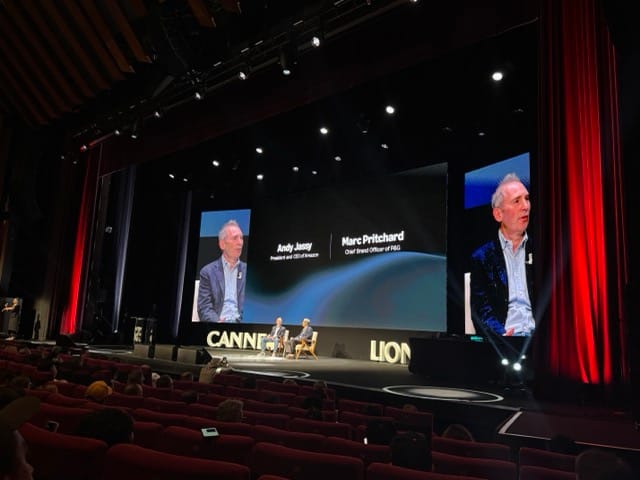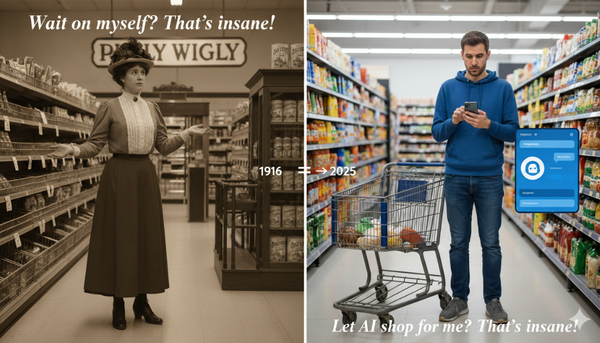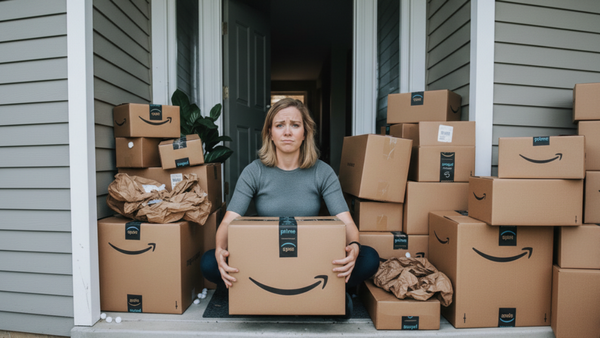Cannes Confessional #4: RMNs Should Chase That Brand Marketing Budget
B2B retail media, the ad tech sophistication gap, and identifying what you 'came from the factory with'.

The Cannes Festival of Creativity is officially over for 2025, but all the folks who travelled home over the weekend are probably still writing up their notes.
During the week-long event, I caught up at the end of each day with my friend and head of the Digital Shelf Institute, Lauren Livak, as well as fellow retail media industry commentator Colin Lewis, to process the rapid-fire insights and spot patterns that might get lost in the Cannes chaos. Today I'm sharing highlights from our Day 3 conversation, covering everything from B2B retail media, to the ad tech sophistication gap.
Make sure you check out Lauren's wonderful Unpacking the Digital Shelf podcast to hear all our takeaways from the week.
To Secure Incremental Growth, RMNs Must Tap Brand Marketing Budgets
At the Mirakl Cabana on Wednesday, BCG's Daniel Gospodinov presented research on "six questions for scaling retail media outside the US." The standout finding was revealing: the top reason for retailers to invest in retail media was to tap into net new funds, particularly from the brand budget.
This addresses persistent industry criticism that retail media is just shopper marketing or trade marketing dollars being reshuffled. But BCG's research suggests retailers already understand they can't succeed by "robbing Peter to pay Paul" - they need to access those larger brand marketing budgets.
BCG's proposed solution was particularly nuanced: retail media sales teams need at least one person who specifically deals with brand marketing - someone who speaks that language. This isn't just about having media sales experience; many retail media network teams lack anyone with a true brand marketing background who can navigate those conversations effectively.
Colin identified what he sees as the core issue holding back retail media growth: "They don't realize they're in the media business and then the people they're talking to don't realize they're in the marketing business."
This disconnect manifests in several ways:
- Retailers approaching media sales without understanding they're competing against Google and Meta for marketing dollars
- Brand marketers not recognizing that retail media requires different measurement and planning approaches than traditional digital advertising
- Internal teams on both sides lacking the cross-functional expertise to bridge these gaps
The industry recognizes this challenge. I noted that there's a notable trend of retail media network leaders moving to tech vendors because tech vendors understand that to sell their technology to retailers, we need someone who used to be at a retailer. But many retailers themselves haven't made the reverse connection: to sell media effectively, they need people who have bought and sold media previously.
Amazon's Approach to Speed and Decision-Making
Amazon CEO Andy Jassy delivered what may have been the most quotable line of the day: "Speed is a leadership decision" which I covered in a Cannes recap last week. He was discussing Amazon's ability to fail, test, learn, and move quickly - particularly relevant for both slow-moving retailers and large brands struggling with change management.
Colin mentioned a conversation that he had with Stijn Demeersseman, head of Amazon advertising in Europe, provided additional context on how Amazon actually achieves this speed. According to Demeersseman, Amazon has "a very rational approach to the world. You've got your set of KPIs and you deliver around your KPIs, not outside of the KPIs."
This isn't about working in a high-stress environment - it's about organizational clarity. Amazon's famous "no PowerPoint, write things down" culture and their "no bureaucracy" email address (which led to changes in over 400 processes) reflect systematic approaches to removing friction.
The implications for retail media are significant: speed isn't about working harder, it's about making organizational decisions that enable faster execution.
He also made a striking observation: "Marketing directors are going to need to understand ad tech."
Even someone with Demeersseman's extensive background admitted to getting "schooled" in recent meetings about ad tech complexity. If senior Amazon advertising executives are still learning, imagine the challenge for marketing directors at traditional brands.
This technical sophistication requirement is only growing. The days of marketers being able to delegate all technical details to agencies or internal teams are ending.

Platform Integration: Nectar 360's Vision
At the Nectar 360 summit, Colin witnessed the launch of "Pollen" - "a combination of audience insights, media planning, activation, optimization, and measurement in one single platform." The capability spans onsite, offsite, and in-store activation with AI integration throughout.
Colin's assessment was that "Everybody's gonna have to have one of these, regardless." This reflects the industry's movement toward unified solutions that connect the entire retail media workflow, similar to what Amazon Marketing Cloud provides for Amazon's ecosystem or what Walmart is building with Scintilla.
The fragmentation of tools and data sources that currently characterizes retail media is becoming unsustainable as marketers demand more sophisticated measurement and optimization capabilities.
B2B Retail Media's Quiet Expansion
A less obvious but significant trend emerged in Colin's conversation with Joe Cano, who heads Lowe's marketplace. Lowe's, the second-largest DIY retailer after Home Depot, has been building sophisticated B2B capabilities targeting trade professionals through apps and online delivery systems.
The retail media implications are intriguing: "layering retail media over that as well, but in the B2B context." This represents a largely unexplored area where retail media networks could capture professional purchasing decisions, not just consumer ones.
Colin noted that B2B themes were more prevalent this year than last, suggesting the industry is recognizing opportunities beyond traditional consumer retail media.
Authenticity and Differentiation in an AI World
From the Women of Retail Media Collective panel came advice with broader implications: "lean into what differentiates you." As Lauren observed, this theme connects to the future of work in an AI-dominated world - the need to "lean into what value you bring outside of tech, the connections you bring, who you are as a human."
Colin then shared one of his favorite career coaching frameworks, which me and Lauren both resonated with: "What's the thing you find easy to do that everybody else finds hard? What did you 'come from the factory' with?"
For retailers building RMNs, this means identifying unique audience value propositions rather than copying Amazon's approach. For individuals, it means developing authentic strengths that complement rather than compete with AI capabilities.
Well, that's a wrap for my coverage of Cannes in 2025! If you want to hear more recaps from myself, Lauren, and Colin, please check out the Unpacking the Digital Shelf podcast. You can also catch up on my previous Cannes blog recaps:





